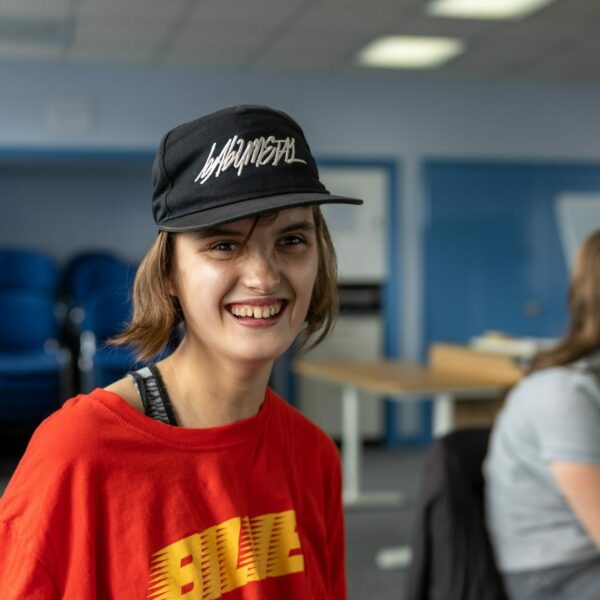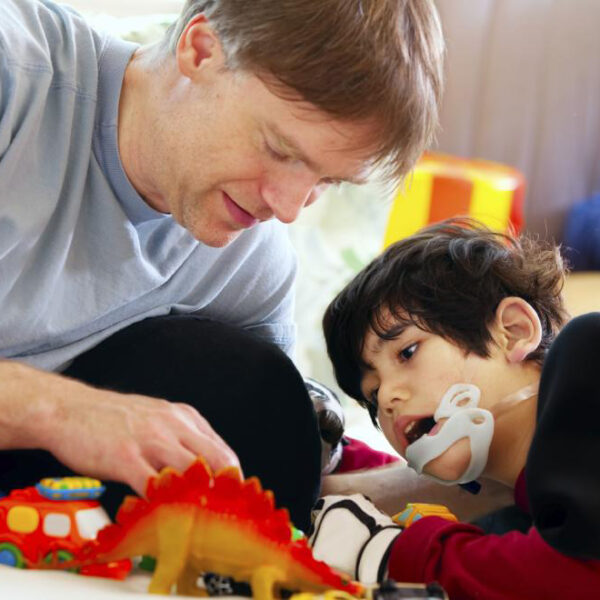Moving to adult social care
As far as social care is concerned, your child is considered an adult when they turn 18. This means that your local authority’s adult social care team will now be responsible for any support they get with daily life. The adult social care team will assess their needs and your needs as a carer of an adult to see if you should get support.
What changes for you as a carer?
The local authority has a duty to assess your needs as a carer if you ask them to.
Your needs will be considered more separately when your child turns 18, because you are now caring for an adult. Your caring role is no longer ‘assumed’, and the assessment is more focused on your willingness and ability to continue caring for your young person.
The carers’ assessment will look at your potential need for education, employment or a social life in a way that it didn’t when you were caring for a younger child. Parent carers are sometimes pleasantly surprised to have their needs taken into account in this way for the first time.
See for more information about the carers assessment from Carers UK.
You could get access to general carers’ support schemes such as a Carers Card for discounts and activities, or you may also be entitled to other services such as your own support plan and personal budget.
It’s a good idea to make sure you are getting all the financial support and benefits you’re entitled to as a carer. They can help with some of the costs of caring or contribute towards your pension entitlements in the future. Amaze can give advice about disability benefits like Carers’ Allowance so contact our advice line.
The first step is always to speak to a professional who can help.
What changes for your young person?
Your son or daughter should now be involved in any decision making about their lives. They may wish to move out or manage their own money, for example, and you and the services that support them should help them to follow their wishes. Read our fact sheet on Involving Young People (pdf 675kb) for tips on getting them involved in decision making. If you want to understand more about mental capacity and how the right to make decisions changes when your child becomes an adult see our section on Rights and voice.
If your son or daughter had support from children’s disability social care as a child, there is no automatic guarantee they’ll qualify for adult social care. Their needs will have to be reassessed by adult social care services as they have different rules and criteria for who can get support.
Services they had as a child will not just stop, however. The Care Act 2014 stipulates that any social care support your young person is already getting must be maintained until their needs as an adult have been fully assessed.
If your son or daughter has never had any social care support, they may become eligible as an adult so it’s worth asking for their needs to be assessed. The Care Act 2014 says that the council must carry out a needs assessment for anyone over 18 who appears to need care and support, and this is not dependent on them qualifying for support as a child.
Read the government’s information about the transition from children’s to adult care and support
Who is eligible for social care as an adult?
Your young person does not need to have a diagnosis, an EHCP or be getting disability benefits to qualify for adult social care. And they do not need to have had support as a child from children’s social care.
For a young person to be eligible for adult social care or support services, they must have a physical or mental impairment or illness that means they are unable to do at least two of these things (called specified outcomes):
- Manage food and eat well
- Keep clean
- Use the toilet properly
- Get dressed in clothes that keep them safe and warm
- Be safe in the home
- Look after the home
- Be able to make and keep friends and other relationships as well as see family
- Have a job, go to college or volunteer to work somewhere
- Use services like buses/trains, shops, swimming pools, the local pub and cinema
- Carry out caring responsibilities
Their wellbeing must be significantly affected by the inability to achieve these outcomes.
Your council may say that they measure your young person’s needs against other ‘outcomes’ too – so ask what these might be. They also consider whether your young person’s needs may change by looking at their care and support needs over the last year.
The transition assessment (child's needs assessment)
Disabled young people approaching their 18th birthday can ask adult social care for an assessment of their needs. This is called a child’s needs assessment, or more commonly. a transition assessment.
When does the transition assessment happen?
The transition assessment should take place before your young person’s 18th birthday. The Care Act does not stipulate a specific time for this, only that it should be carried out at a time when it is of “significant benefit” to the young person’s preparation for adulthood. For most young people this will happen sometime between 16 and 18 though some families find that it can all be a bit last minute.
If your child has an EHCP but is not currently getting any care, their annual review is a good moment to start talking about social care or triggering an assessment, etc.
If you know that your son or daughter wants to move out of home soon after they turn 18 (or you want them to), you will need to say that to social care in good time.
If your young person is carrying on in education and living at home with you, like most 18-year-olds, the transition assessment is more about long term forward planning and switching some, or all, of the support they get now to an adult equivalent. For example, if you get direct payments these will be paid now by adult services and the amount may be similar.
The transition assessment process
The transition (aka child’s needs) assessment is coordinated by one of the adult social care teams. During the assessment, a ‘care manager’ will gather information from you, the young person and workers from education, health, and social care. Assessments are usually done in your home and may take more than one visit.
There are different types of care managers with different job titles – including social workers, assessors, resource officers, transition workers and reviewing officers.
The assessor will keep notes of what is said, any services your child needs and whether there’s anything you disagree with. During the assessment process, it’s important to involve the young person as much as possible. They may need specialist support to help them communicate their thoughts and feelings. See Involving young people.
If the council decides that your young person is eligible for services or support, you should get a written record of the assessment. Someone from adult social care will help you put together a care and support plan.
The support plan will outline the young person’s and carer’s needs (see carers’ assessment section) and the support that is needed. Someone from adult social care should discuss the recommendations with you before presenting them to a Funding Panel. The panel is where decisions about the financial aspects of your child’s support needs are made. If your young person is eligible for support, they will be allocated an approximate sum of money called a ‘personal budget’ to cover the cost of their support.
If your young person over 18 has an EHC plan, their care and support plan should be incorporated into the EHC plan, where there is one, rather than developed separately. It will include those elements of their care and support which are directly related to their SEN and specify other care and support. It should be noted clearly which elements are not directly related to SEN.
If the council decides your young person is not eligible for support, you should get a written statement telling you why. Even when an assessment says that someone does not have needs that the local authority should meet, the local authority must write to people about what needs they do have, and how to meet them or prevent further needs developing. They should give you information about what can be done and what support there might be in the local community.
You can complain to the council about their refusal to carry out an adult social care assessment through their complaints procedure:
You can also contact the council’s social care department again at any point in the future to re-request support.
See further information about complaining about social care assessments, from Scope.
Adult social care assessments (not transition)
Some young people’s needs may change after they reach 18.
If they are likely to need support from social care, they will need have an adult social care assessment. Read about adult social care assessments on your local authority website:
Types of adult social care provision
Most adult social care provision these days is organised by you or your young person. You pay for what you need using direct payments from your personal budget. As some traditional day activities such as day centres have closed, more young adults will instead find themselves going to a mixture of provision at places like Grace Eyre (Brighton & Hove) or Project Artworks (East Sussex) for specific activities.
As the majority of young disabled people will remain in some form of education beyond 18 (even up to 25), daytime activities will not really be needed or relevant until they leave education.
While your young person is still living at home, there is very limited residential respite care, so your focus might shift to thinking about how and where they might move to independent living via shared lives, supported living, etc a few years down the line, even if this isn’t something you are thinking about yet at 18. Read more about Housing for young disabled people.
Charging/paying for adult social care
Adults are normally expected to pay for some of their social care. How much your young person pays will depend on their income and not the family’s.
This is unlikely to be much of an issue when your child is 18, as most disabled young people are still in education and living at home at this age and won’t have any income, but it may be something you need to pay attention to when they get older or want to live independently.
If your young person has any sizeable capital, however, perhaps an inheritance or compensation payment, you may wish to get advice. You can contact Amaze SENDIASS, or other disability organisations such as Possability People or Scope. You can also use general advice services such as Citizens Advice.
For more information on how care costs are calculated, see Mencap’s or Scope’s online information on paying for social care.
If you want to know more about how your local authority assesses social care costs, visit:
Be aware that social care tend to award the same allowances for everyone’s support. If your young person has extra needs – for example their furniture and clothes need replacing frequently, or they require a larger vehicle or a special diet – you will need to make the case for this and provide evidence such as receipts.
Next steps after 18
These days most 18-year-olds are still in education or living at home, but we advise that you don’t leave it too late to start thinking about longer term plans for where and how they are going to live as an adult.
You will want your son or daughter to move to independent living when you are still young, fit and active enough to help make it work. Our Housing section has more information about the types of independent living that are available. Or read our section on Rights and voice to get advice on making sure your young person is fully involved in decisions about their life.






